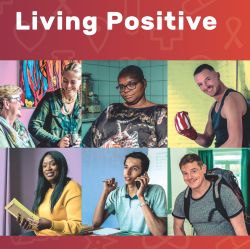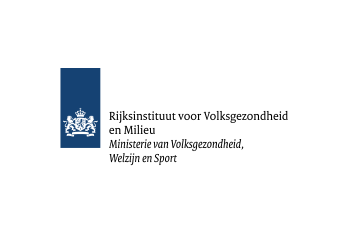Everyone reacts in their own way to their HIV-diagnosis. Some people a hit hard by it; for others, it takes a while to sink in. Who you hear it from can make a difference; someone you know and trust, such as your general practitioner, or someone you don’t know.
Maybe you have already been thinking it might be HIV. The diagnosis may hit you like a lightning bolt, shattering the warm fuzzy feeling of your pregnancy. Many people find it hard to come to terms with HIV, but ultimately get something positive out of it as well. This could be self-awareness, personal growth, or living more in the moment.
In brief
- You may get really shocked by your HIV diagnosis.
- It can take a while to come to terms with HIV.
- There are four phases of dealing with it: acceptance, allowing your feelings to surface, changing your attitude and moving on.
- It can be good to talk about your HIV diagnosis, either to people you know or to people you don’t know.
- Many people end up retaining something positive from their diagnosis, such as personal growth.
Anyone can catch HIV
Would it surprise you to know that many different kinds of people are living with HIV? There are various ways of getting HIV, and the virus does not discriminate. Even people you wouldn’t expect to, may have HIV.
In the Netherlands, around four in ten people with HIV are heterosexual, and six in ten are gay or bisexual. Approximately one in five people with HIV are female. In the Netherlands, about four in ten people with HIV are wholly or partly of foreign origin. There are various ways of catching HIV. Some people have been infected through sex, others through a blood transfusion, some from their mother during pregnancy or breastfeeding, and some people don’t know how they got HIV.
Some individuals may think they can judge people who have HIV, but ultimately anyone can catch HIV. There are still many outdated views on HIV, and this makes it important for HIV to be a normal topic of conversation. Especially now that the current treatment means people with HIV live as long as people without it, and that when the virus is sufficiently suppressed, it cannot be transmitted sexually.
Dealing with it
You will probably experience all kinds of thoughts and feelings if you’ve just been told you have HIV. This is completely normal. To be able to deal with it, many people go through a four-phase process, and these phases often overlap. Some people get back almost immediately to living their lives as normal, for others it takes months or years. The four phases are:
Acceptance
Possibly it may not really sink in at first. You just can’t believe it. You shove it to the back of your mind. It can take a while to accept you have HIV if you weren't really expecting it, if you got told the result insensitively in a telephone call, or if you didn't even know you were being tested for HIV. This is actually against the guidelines, but it does happen in a few cases; in hospitals or asylum seeker centres, for example.
You may have been struggling with your health for years and are relieved that you finally know the reason for this. This may sound strange to you, but some people think: ‘Now I don't have to worry about getting HIV, because I already have it.’ Nobody wants to get HIV, but you do have to deal with it for the rest of your life. You might blame yourself: ‘If only I'd been more careful...’ Or: ‘If only I hadn't been so naïve.’ You can't turn back time, and there is currently no medicine that can cure you of HIV.
Let your feelings in
Once you accept you have HIV, there is usually room for your feelings. What you are feeling depends very much on your situation, but it differs from person to person. What about you? You may be in shock. You may be worried about your partner, ex-partners, or people with whom you have had sex. You may feel dirty and contagious. You may not feel like having sex. You may be afraid of getting sick, and afraid of dying. You may feel ashamed. You may feel guilty. You may be totally confused. Or panicking. You may suffer from low self-esteem. Or feel insecure. Everyone experiences it in their own way, and it’s possible you don’t have these feelings at all. But it is important to let your feelings in and to process them. It’s absolutely fine to take your time for this.
New attitude
This can involve a whole lot of things. Who do you tell about your HIV diagnoses? Or do you keep it to yourself? How do you deal with sex? How do you see yourself? And how do others see you when they know you have HIV? How do you deal with it at your work, do you tell your colleagues or your supervisor? If you already don't feel comfortable in your own skin, the diagnosis can make that worse. You have to learn to cope with this as well. The Positive Living brochure provides support.
Positive Living is HIV for beginners: a brochure written in understandable language, with basic information about everything you will have to deal with when you have been told you are HIV-positive. The brochure deals with: accepting HIV, medical checks, blood tests and treatment for HIV. It also covers topics such as your future prospects, lifestyle, desire for children and travel. A version of Positive Living, written in common language, is also available. This contains a simple summary of living with HIV. It is available in Dutch, English, French and Spanish.
Moving forward
Maybe you are now taking your pills on autopilot and frequently forgetting that you have HIV. Maybe you only really think about it when you have to go to the hospital. Or maybe you use your diagnosis to gather people around you and to do fun things.
When you have managed to accept your diagnosis, you may be able to turn it into a strength. You feel strong and confident and you want to do something meaningful for others. You may be eager to share your own story with other people, to raise awareness about living with HIV. Perhaps you want to inspire people, or to be a support for other people with HIV. Maybe you don't have HIV but you would like to contribute something. The Hiv Vereniging (the Dutch Association of people with HIV) offers many possibilities, and we can help you work out what best suits you. For example, you can join a community support group, or a regional support group, for activities that suit you. Read more here about volunteering (in Dutch) at the Hiv Vereniging.
Coming to terms with HIV in your relationship
The effect on your relationship when you are told you have HIV, while your partner doesn't, can differ in each case. Sometimes the partner is very supportive, but in other cases it can result in a lot of tension. Sometimes a partner needs time to get used to it. But sometimes HIV barely has any impact.
If you talk honestly to each other about your feelings, it's easier to be more considerate with each other. Possibly you feel guilty, or you don't feel equal any more. It can be complicated if your partner has been at risk of getting HIV from you. Some people feel an extra responsibility to prevent their partner from getting HIV; others feel that this is really a shared responsibility. Often people blame relationship problems on HIV, while the point is, you may have had relationship problems without HIV.
If your partner also has HIV, that sometimes makes it easier, or the relationship more equal. You might have contracted HIV separately. When there is a possibility that one of you got it from the other, that can create tension. When both partners are told they have HIV at more or less the same time, you often see a kind of pact: this binds us together, we will take care of each other from now on.
Coming to terms with HIV in your sex life
Simply knowing you have HIV can turn your sex life upside down. It won't be the case for everyone, but most people who have just tested positive for HIV put it out of their minds for a while. Take your time to process it. It's not weird to not feel like having sex right now. That is a normal reaction in this situation. It may do you good to seek intimacy though. That can give you support.
Most people find that their sex lives return to normal after a while. Once you’ve taken HIV medication long enough to suppress the virus, you don’t have to worry about transmitting HIV through sex. Undetectable=Untransmittable (in Dutch, n=n). So you don’t have to worry about passing on HIV to your partner. Talk to your specialised HIV doctor or HIV nurse about whether your virus is suppressed.
Talking about HIV?!
Many people benefit from talking about it with someone who is familiar with HIV. For example, you can talk about it with:
someone you know
A friend or acquaintance who is a good listener, and who has HIV or knows other people with HIV. Or a family member you are close to. It doesn't have to be someone who has HIV, sometimes it can help just talking to someone who is a bit less involved.
HIV nurse
You could also talk to someone in the official care sector. An HIV nurse is as specialist nurse working in the hospital where you get support and treatment for HIV. Most HIV nurses are very dedicated. You can go to the counsellor with mental problems, but also with questions about your sex life, for example.
Hiv Vereniging
Call the Servicepunt (Service desk) at the Hiv Vereniging (020 - 689 25 77 – Mondays, Tuesdays and Thursdays 14.00 - 22.00) to pour your heart out and to ask questions. You can also ask the Servicepunt to arrange a face-to-face chat.
The Positive Living workshop series is a special offer for people who have not known their HIV status for very long. This workshop, a series of six, is offered every spring and autumn at various locations in the Netherlands. The workshop series is – in the first instance – intended for people who have relatively recently been diagnosed with HIV. But even when you've known for a bit longer, you can still participate. After a while, you may feel you are ready to absorb more information and to meet other people with HIV.
"I feel like I've made great advances in dealing with it. It's not easy, but I am more able to accept my HIV".
"The wealth of practical information has given me peace of mind".
"In any case, I’ve gained a few friends who have HIV, and I will definitely stay in touch".
Each spring and autumn, the association organises a series of six workshops at various locations across the country. Participation is free. The workshop is led by two well-trained people, who are HIV-positive themselves. The groups are mixed and they are usually given in Dutch, but English is a possibility in some communities. Topics dealt with: medical information; your own thoughts; relationships, intimacy and sexuality; work, school, insurance and travel; discovering new goals. Check where the workshops are being held now, and sign up for them, at the Servicepunt.
You can also apply for peer counselling. The peer counsellors are volunteers who are good listeners and can offer you practical support. The peer counsellors are linked to the Hiv Vereniging, and are trained to give guidance to people. These mentors are themselves HIV-positive, so they are well placed to offer support in living with HIV. Call the Servicepunt at the Hiv Vereniging: 020 - 689 25 77, available every Monday, Tuesday and Thursday 14.00 - 22.00.
There are 160 active volunteers at the Hiv Vereniging. This means there is a wide range of activities on offer. In various regions, and nationwide, there are groups that organise events specifically for young people, families, women, gay people, heterosexuals or people with an immigrant background. These take place either weekly, monthly, twice monthly, or sometimes yearly. Read more here about community support groups (in Dutch) and regional support groups (in Dutch). All activities are listed on the agenda (in Dutch) We also keep you up-to-date on Facebook (in Dutch), about what is offered at the various places.
general practitioner
A general practitioner is the point of contact for all your questions about your health. Your general practitioner can be a good person to talk to, even though he or she might not know everything about HIV. General practitioners have a lot of experience with people who have received a diagnosis that is hard to come to terms with. If you have sexual problems, even though it has nothing to do with your HIV, you can discuss them with your general practitioner. They can refer you to a sex expert.
mental health care
If you have psychosocial problems, you can also get professional help from the GGZ (mental health care) or from the AMW Sociale Zorg (general social work). You need a referral from your general practitioner for this. Talks with a psychologist or psychiatrist generally go a bit deeper. If you need antidepressants, a psychiatrist can prescribe them for you but a psychologist can’t.
A social worker can help you with practical matters, like finances. You will sometimes need to wait for a period until you start your talks. In some municipalities there are psychiatrists, psychologists and social workers who are specialised in HIV. For example, the HIV team at GGZ inGeest in Amsterdam (020 - 788 45 55) and the Hiv Hulpverlening (HIV assistance) at Humanitas Rotterdam (010 - 236 52 12).
Brochures about hiv
- Living Positive
You’ve just learned that you have HIV? Or you have a close friend, a partner or family member who is living with HIV? This brochure provides information on living with HIV and points you towards more resources, support and opportunities to meet others. It is written by and for people with HIV - Living positive in common language
Various topics are discussed that are important and about which questions arise when someone is diagnosed with HIV. About telling, medication, treatment, sex, work and healthy aging. Intended for people who have not yet mastered the language well or are not strong in the written word.










